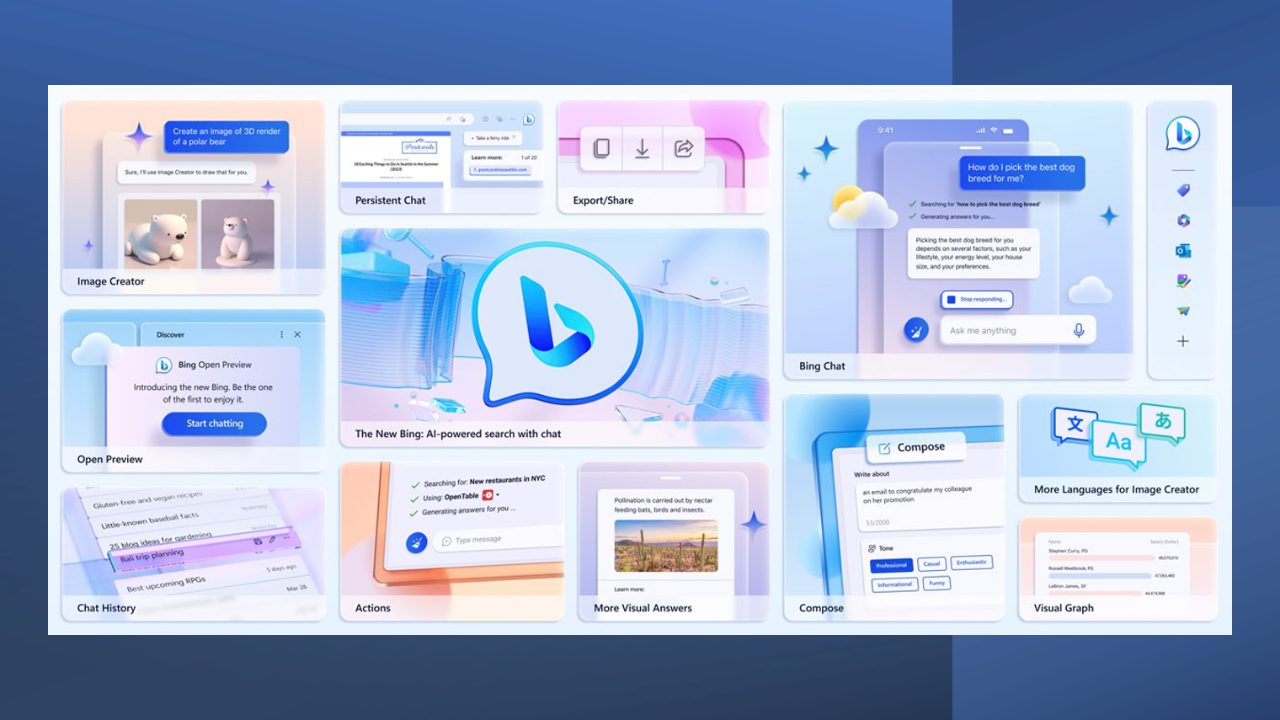
Microsoft is removing the waitlist for its new AI-powered Bing today, and the company also detailed several new features to enhance the search experience with AI. The software giant also plans to turn its Bing chatbot into a platform and let developers create third-party plugins for it, echoing the recent launch of the first plugins for OpenAI’s ChatGPT.
In just three months, Microsoft says that its new Bing AI has gained real momentum: The company observed over a half billion chats, over 200 million images created with Bing Image Creator, and over 100 million daily active users for the search engine. By recently integrating its Bing AI into the Windows taskbar, Microsoft also claims that it’s now able to reach over 500 million users every month.
“Thanks to tremendous customer adoption, engagement and feedback, we’re ready to take the next step and are announcing the new Bing is now in Open Preview and no longer has a waitlist. This means that it will now be easier than ever for everyone to try the new Bing and Edge by simply signing into Bing with your Microsoft Account,” explained Yusuf Mehdi, CVP and Consumer Chief Marketing Officer at Microsoft.
Microsoft’s AI-powered Bing is getting image results, chat history, and more
If everyone can now try the new AI-powered Bing, a lot of new features are also in the pipeline. Here’s everything Microsoft announced today:
- More languages for Bing Image Creator: The Bing Image Creator, which lets users create images with a simple description now supports more than 100 languages currently supported on Bing.
- More visual answers: The Bing chatbot will be able to include charts and graphs in its answers, building on Bing’s existing Knowledge Cards and visual search features.
- Visual search in chat: Users will be able to upload images in conversations with the Bing chatbot to search the web for more information.
- Chat history: Soon, Bing users will be able to continue a previous conversation with the Bing chatbot. Microsoft is also working on making Bing capable of using context from a previous conversation in a new one.
- Chat export and share: Another top requested feature coming soon is the ability to export a conversation with the Bing chatbot to share it with others or embed it in a document.
- Third-party plugins: Microsoft will let developers create plugins allowing Bing users to access third-party services within a chat conversation.
That’s it for the main new features coming soon to Microsoft’s AI-powered Bing, and the company said that it will share more details about third-party plugins at its Build developer conference later this month. However, the company also announced today some new AI-powered capabilities for its Edge browser.
Microsoft Edge is getting new AI-powered features too
Microsoft Edge is the only web browser to offer a deep Bing integration, and Microsoft says it’s where 25% of Bing chats come from. The Chat feature in Microsoft Edge will soon get improved summarization capabilities for long documents and web pages. On mobile, Microsoft Edge will also let users ask questions about a page they’re viewing.
In the coming weeks, Microsoft will also introduce Edge actions in the browser’s sidebar. “For example, if you want to watch a particular movie, actions in Edge will find and show you options in chat in the sidebar and then play the movie you want from where it’s available,” Mehdi explained.
Lastly, Mehdi teased that Microsoft was in the process of redesigning Microsoft Edge. “As these changes begin to roll out, you’ll begin to see a sleeker and enhanced user interface including a streamlined look, rounded corners, organized containers and semi-transparent visual elements,” the exec said.
Microsoft is iterating really fast on its new AI-powered Bing, but the company’s partnership with OpenAI is already impacting many other Microsoft products. The software giant is in the process of implementing new “Copilot” experience across Microsoft 365 apps and services, and SharePoint is one of the latest apps to receive the Copilot treatment.



